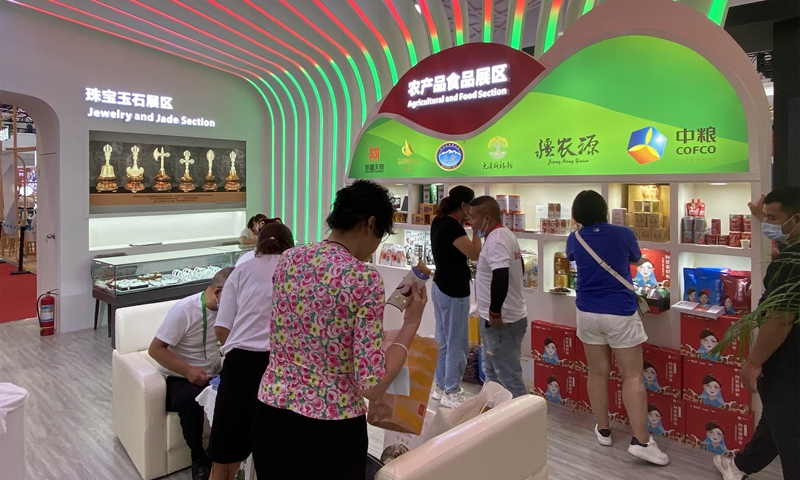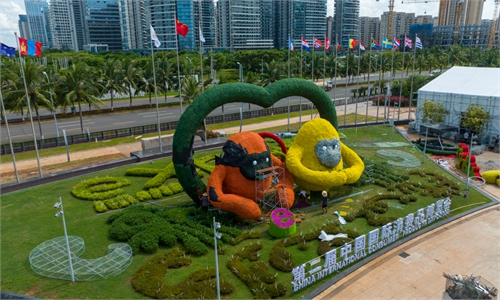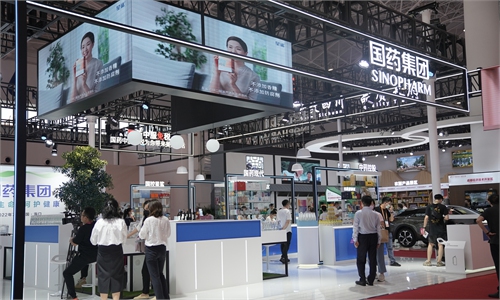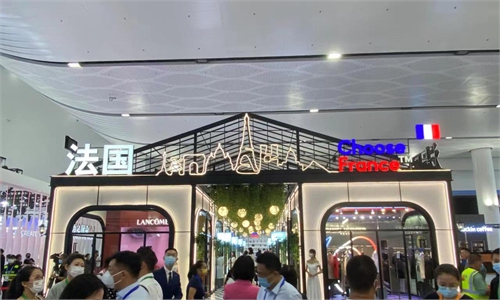Xinjiang firms seek strong presence in domestic market, partly in response to US 'evil bill'
Xinjiang products gain popularity at CICPE

Booths of firms from China's Northwest Xinjiang region at the China International Consumer Products Expo (CICPE) in Haikou, South China's Hainan Province Photo: GT
Businesses hailing from Northwest China's Xinjiang region are actively in pursuit of a strong presence in the higher-end domestic consumer market, partly in response to unfounded US sanctions that have sent shockwaves through a wide range of Xinjiang-origin products, according to exhibitors from the region at the ongoing China International Consumer Products Expo (CICPE) in Haikou, South China's Hainan Province.
Xinjiang elements are among the attention grabbers at the second CICPE, where farm produce, food, jewelry and jade, and garments and textiles, among other Xinjiang-produced items, were on display.
The Xinjiang Production and Construction Corps (XPCC) also organized 34 firms to attend this year's CICPE, as local businesses are striving for a bigger foothold in the domestic market, especially the higher-end segment.
Describing her hometown as a large, thinly populated area, Gu Shuiping, the legal representative of a local specialized farmers' cooperative, said that her cooperative that covers 5,000 mu (333.33 hectares) of land functions as a processing business to ship supplies from around 3,000 local farmers to the domestic market.
Self-branded carrot juice is one of the cooperative's green food hits, and its annual carrot sales hit 60,000 tons, Gu told the Global Times on Wednesday at the cooperative's booth as part of the XPCC exhibits.
With an annual output of 80-90 million yuan ($11.85 million-$13.33 million) entirely from the domestic market, the cooperative is betting on its debut at the CICPE to get acquainted with purchasers from across the country, thereby raising local farmers' incomes, Gu said.
Exports to countries such as Laos and Vietnam used to account for a tiny portion of the cooperative's business, but the lack of sales networks in overseas markets put its foreign sales under high cost pressure, she continued, adding that the cooperative would put overseas plans on the back burner and focus on the vibrant domestic market instead, where consumers' needs for high-quality and green food are on the rise.
The cooperative's booth, in addition to other stalls where Xinjiang-origin fruit juice, dates, camel milk powder and other premium items are being showcased, was surrounded by visitors eager to place orders on Wednesday, epitomizing the booming agriculture and livestock sectors, the mainstay of Xinjiang's economy.
In the first half, Xinjiang region's GDP grew by 4.9 percent year-on-year, 2.4 percentage points higher than the national level, official data showed, ranking the autonomous region among the nation's fastest-growing regions.
On the part of other export-oriented local businesses that took the CICPE stage, aiming for a strong domestic presence came across as a more imperative push, exhibitors told the Global Times, citing the fallout from the US' so-called Uyghur Forced Labor Prevention Act (UFLPA), widely dubbed an "evil bill," which aims to scrap imports from Xinjiang on unsubstantiated "forced labor" claims.
According to Liu Haifeng, chief scientist and president of China National Color Cotton Corp, the company had been eyeing the US market for its strategic vision before the US put Xinjiang cotton in the crosshairs, but those plans have been outright revoked.
"The US' 'evil bill' has dealt a big blow to Xinjiang cotton, as yarn, fabric and finished items producers mostly use cotton as a raw material in their exports. Moreover, US allies have also joined the sanctioning move targeting Xinjiang cotton," Liu told the Global Times on the sidelines of the expo.
Cotton futures have suffered a plunge accordingly, weighing on the sector at large, Liu said, and although Liu's company focuses on color cotton, it cannot be entirely insulated from the industry-wide impact.
In the case of Xinjiang Guannong Fruit & Antler Co, its tomato-based products such as ketchup, tomato sauce and diced tomatoes are heavily export-oriented and mostly shipped to North America, Europe and Africa.
The UFLPA implementation is tantamount to an end to Guannong's presence in the US market as any product containing Xinjiang tomatoes would be banned from exports to the US, Huang Wenqing from Guannong told the Global Times at the company's booth at the expo.
The US' traditional allies and other countries befriending the US quickly followed suit in barring Xinjiang exports. Hence, the company's exports to these markets have also been affected.
Xinjiang accounts for nearly 90 percent of the country's cotton output, while roughly one-third of global tomato output comes from China, of which about 90 percent is Xinjiang-produced, industry data showed.
In the wake of the UFLPA's implementation, the huge domestic market with a vast middle-income population is seen as a most reliable underpinning for the color cotton firm and the tomato-dependent firm.
In the words of Liu, he was hoping for the CICPE attendance to explore the domestic market. Naturally colored cotton, without dye, is believed to appeal to domestic consumers who favor healthy and ecological ideas.
Guannong, which had been 99 percent export-reliant, is also scrambling for its brand to be recognized in the domestic market, Huang said, adding that the company's overseas sales actually increased last year, buoyed by brisk growth in Africa, the Middle East and Central Asia. It logged an impressive growth rate in the Russian market in particular.
"Worldwide, not only the US has friends, China also has a lot of friends," Huang remarked.



